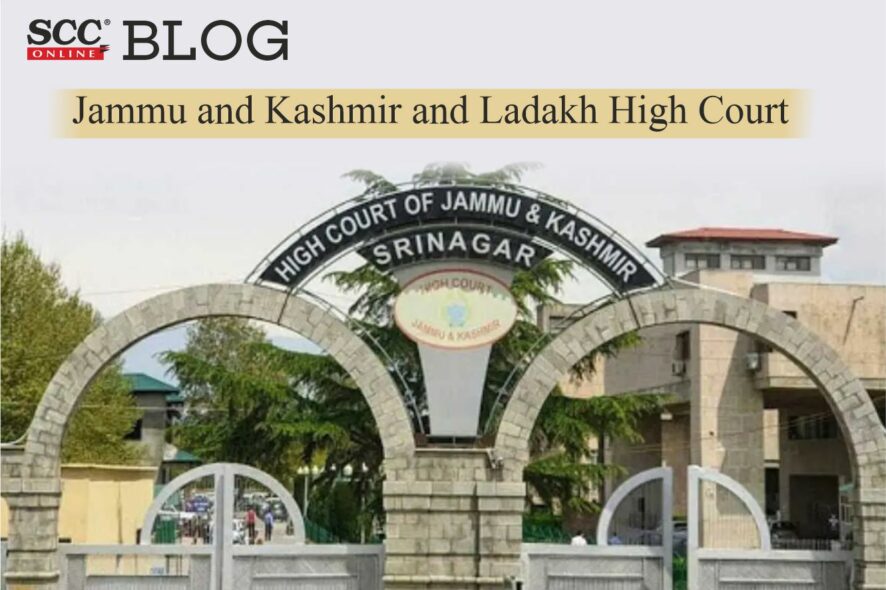Jammu and Kashmir and Ladakh High Court: Sanjay Dhar, J. dismissed a petition which was filed challenging FIR registered under Sections 153, 353 Ranbir Penal Code, 1989 and 13 of Unlawful Activities (Prevention) Act, 1967 (ULA(P) Act).
Petitioner was working as Assistant Professor, Geography, at Government Degree College and it was averred that the petitioner is an RTI activist and has filed many RTI applications for advancing the interests of the society so that public funds are utilized in a better manner. In January, 2017 he had filed a writ petition before the High Court calling into question the illegal extraction of minerals wherein an interim direction was passed by this Court and as a consequence of this, District Magistrate, Kulgam, asked Principal, Government Degree College, Kulgam, to enquire into the activities of the petitioner and in the report nothing adverse was found against the him. It was further averred that the petitioner filed an RTI application seeking information regarding recruitment of Rahbar-e-Khel in the year 2018. According to the petitioner, all the aforesaid activities irked the respondents, as a consequence whereof, the impugned FIR came to be lodged against him.
Respondents, on the other hand, submitted that the petitioner was indulging in criminal activities and he has been misusing and abusing the freedom of expression by taking aid of social media. According to respondents, the activities of the petitioner have the effect of motivating the students of the college to disrupt peace and tranquility in the area as he is provoking them to indulge in violence against the State Administration.
The Court, after perusing the case diary, noted that the respondents recorded statements of the witnesses under Section 161 of the Criminal Procedure Code, 1973 (CrPC) and they have also seized the video clips which are alleged to have been uploaded by the petitioner on YouTube where he was trying to motivate the common people towards separatism and was provoking them against the police and security forces as also against district administration. Upon watching the video clips the Court found that in one video petitioner was seen conveying to his audience that the children of Kashmir are being oppressed by the security forces and the army. In yet another video clip, the petitioner was conveying that the army is hampering the movement of the people and it is obstructing the children from going to schools which has led to closure of schools. In yet another video clip, the petitioner was seen pleading cause relating to release of a person who was in custody for indulging in stone pelting and terrorist activities.
Consequently, keeping in mind the material collected by the investigating agency during the investigation of the case, the Court, prima facie, found that the petitioner was provoking or at least intending to provoke his audience to use force or violence against the institutions like the army, the police and the civil administration. promoting enmity between the people living in Kashmir and those living in other parts of the country.
The Court was of the opinion that what offences are exactly established or made out against the petitioner would be known only after the investigation is completed by the respondents and final report is laid before the competent court but at this stage of the investigation, it can safely be stated that the material collected by the investigating agency so far, does disclose commission of cognizable offences against the petitioner.
The Court, relying on Neeharika Infrastructure (P) Ltd. v. State of Maharashtra, 2021 SCC Online SC 315, reiterated that the Supreme Court had clearly stated in this case that High Court should exercise its powers under Section 482 of the CrPC to quash the investigation in an FIR in exceptional circumstances because it is the statutory duty of an investigating agency to take the investigation into an FIR to its logical conclusion.
Thus, the Court dismissed the petition holding that instant case does not fall into the category of cases in which this Court would exercise its powers under Section 482 of the CrPC to quash the proceedings in the impugned FIR.
[Abdul Bari Naik v. State of J&K, 2022 SCC OnLine J&K 666, decided on 29-08-2022]
Advocates who appeared in this case :
P.S. Ahmad, Advocate, for the Petitioner;
Usman Gani, Advocate, for the Respondent.
*Suchita Shukla, Editorial Assistant has reported this brief.






